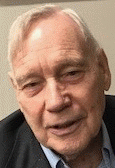History is amoebic but essential. How much of it do we really know?
Dr. William F. Pepper believes that the best way to move forward is to learn from the past.
He is working on a new book that traces assassinations of high-powered rulers from ancient Sumeria through to the present.
Next year will mark the fiftieth anniversary of the assassinations of Robert F. Kennedy and Martin Luther King Jr., Pepper told attendees of a press conference he held this morning, July 20, at the National Press Club in Washington, DC. His focus was what moderator Andrew Kreig called "an exceptional slice of history": the assassinations of two of the prolific author's close friends, Robert F. Kennedy and Martin Luther King Jr.
He said to expect many books on the subject next year, which will contain but "a small hint of what happened."
The real story hasn't been told, he said. The public doesn't know it.
But the immediate purpose this morning was to announce his 200-page petition to the Organization of American States (OAS) human rights body "to obtain under treaty rights a new trial for Sirhan Sirhan or the kind of evidentiary hearing that California and other U.S. authorities have denied him."
Since 2007, Pepper has been working to have RFK's alleged assassin, Sirhan Sirhan, exonerated. He has collected reams of evidence to prove that Sirhan's shots did not kill Kennedy. The lethal shot was to the back of his head, by another culprit still not brought to justice, he said. Similarly, the JFK assassination has been proved to have been carried out by others in addition to Lee Harvey Oswald. The "Camelot" president had, in his brief tenure, antagonized a host of powerful entities because of "radical" policies like wanting to vacate U.S. troops from Vietnam, overthrow Fidel Castro in Cuba without using U.S. troops, force the resignation of war-mongering CIA and Pentagon leaders, promote desegregation, prosecute Mafia leaders, and review the Federal Reserve Act of 1913 and oil depletion allowance.
Pepper is also this "dangerous." Before Pepper turned 30, he recalled this week, he worked on Robert Kennedy's successful 1964 race for a New York seat in the U.S. Senate. His photo essay on the ravages of the Vietnam War moved King to contact Pepper in 1967 to invite him to work together on a planned expansion of the civil rights movement into the fields of economic justice and opposition to war.
The danger to the establishment proved so great, Pepper said, that President Lyndon B. Johnson contacted Look Magazine editor-in-chief William Attwood, a former ambassador for President's Kennedy and LBJ, to request that Attwood kill Pepper's prospective war coverage.
It is in the spirit of this lifetime of bold journalism and legal work that Pepper's extensive research led him to believe that the convicted killers of his friends Robert Kennedy and Martin Luther King were innocent of fatal shots. Pepper has written three books about MLK, the most recent one published last year, The Plot to Kill King: The Truth Behind the Assassination of Martin Luther King Jr. But his outstanding accomplishment was, after 10 years of research and with the hard-won cooperation of the King family--Coretta Scott in particular--to win a civil trial verdict in 1999 naming Loyd [sic] Jowers as complicit in killing King, thereby vindicating the then-deceased James Earl Ray. With 70 witnesses, a 30-day civil trial exonerated Ray.
Would a similar civil rather than criminal trial exonerate Sirhan, now 74 years old? The costs would run well into six figures and there is no funding for it, said Pepper
And why has Pepper gone to the OAS's human rights body, the Inter-American Council on Human Rights (IACHR)? Because the reams of evidence he accumulated and made accessible even before the first trial concluded were not admitted into the proceedings. Instead, they were submitted to the California Supreme Court, then federal court, then to the Ninth Circuit Court of Appeals (the most liberal circuit court in this country), and finally SCOTUS, without one of them agreeing to order retrial or a hearing on evidence. California's attorney general was uninterested. The mainstream media weren't interested. That exhausted U.S. resources.
The OAS, via its Inter-American Council on Human Rights, has the power to enforce by treaty national commitment to fair process and other civil rights now that all U.S. remedies have been exhausted. But the OAS agrees to try only 10 percent of the cases submitted to it.
(Note: You can view every article as one long page if you sign up as an Advocate Member, or higher).






